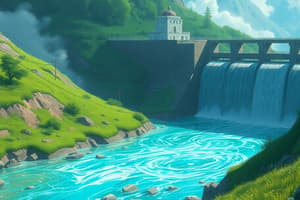Podcast
Questions and Answers
Uses of Dams: Dams are built, To impound rivers and rainwater that can be used later to irrigate agricultural fields. For electricity generation. Water supply for domestic and industrial uses. Flood control. Recreation, inland navigation and fish breeding. Side Effects of Creating Dams: Regulating and ______ming rivers affect their natural flow. Poorer the habitats for the rivers’ aquatic life. Fragmented rivers make it difficult for aquatic fauna to migrate. Dams created on the floodplains submerge the existing vegetation and soil, leading to its decomposition over a period of time. Creating of large ______s has been the cause of many new environmental movements like the ‘Narmada Bachao Andolan’ and the ‘Tehri Dam Andolan’. Many times local people had to give up their land, livelihood and their control.
Uses of Dams: Dams are built, To impound rivers and rainwater that can be used later to irrigate agricultural fields. For electricity generation. Water supply for domestic and industrial uses. Flood control. Recreation, inland navigation and fish breeding. Side Effects of Creating Dams: Regulating and ______ming rivers affect their natural flow. Poorer the habitats for the rivers’ aquatic life. Fragmented rivers make it difficult for aquatic fauna to migrate. Dams created on the floodplains submerge the existing vegetation and soil, leading to its decomposition over a period of time. Creating of large ______s has been the cause of many new environmental movements like the ‘Narmada Bachao Andolan’ and the ‘Tehri Dam Andolan’. Many times local people had to give up their land, livelihood and their control.
dam
True or false: Dams refer to the reservoir rather than the structure.
True or false: Dams refer to the reservoir rather than the structure.
True (A)
True or false: Dams are only used for electricity generation.
True or false: Dams are only used for electricity generation.
False (B)
True or false: Regulating and damming rivers do not affect their natural flow.
True or false: Regulating and damming rivers do not affect their natural flow.
True or false: Fragmented rivers make it easier for aquatic fauna to migrate.
True or false: Fragmented rivers make it easier for aquatic fauna to migrate.
True or false: Large dams have not been the cause of any new environmental movements.
True or false: Large dams have not been the cause of any new environmental movements.
Flashcards are hidden until you start studying
Study Notes
Uses of Dams
- Dams capture river and rainwater for later use in agricultural irrigation.
- They generate electricity, contributing to renewable energy sources.
- Dams provide water supply for various domestic needs and industrial applications.
- Serve as a means of flood control, reducing the risk of damage during heavy rainfall.
- Support recreational activities, inland navigation, and fish breeding.
Side Effects of Creating Dams
- Regulating and damming rivers disrupt their natural flow, affecting ecosystems.
- Aquatic habitats suffer, leading to poorer conditions for river wildlife.
- Fragmented rivers hinder migration routes for aquatic fauna.
- Floodplains submerged by dams can destroy existing vegetation and soil, causing decomposition over time.
- The construction of large dams has sparked significant environmental movements, including the ‘Narmada Bachao Andolan’ and ‘Tehri Dam Andolan’.
- Local communities often face displacement, losing their land, livelihoods, and autonomy.
True or False Statements
- Dams refer to the reservoir rather than the structure: False.
- Dams are only used for electricity generation: False.
- Regulating and damming rivers do not affect their natural flow: False.
- Fragmented rivers make it easier for aquatic fauna to migrate: False.
- Large dams have not been the cause of any new environmental movements: False.
Studying That Suits You
Use AI to generate personalized quizzes and flashcards to suit your learning preferences.




